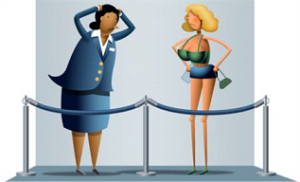 If you are Spike Lee or Mark Zuckerberg, you can dress however you want and nobody is going to criticize you. However, if you are not a famous film maker or renowned billionaire, you need to think about what you put on your body. Most of us have heard the phrase ‘dress to impress’ and during a court hearing is not the time to forget this piece of valuable advice.
If you are Spike Lee or Mark Zuckerberg, you can dress however you want and nobody is going to criticize you. However, if you are not a famous film maker or renowned billionaire, you need to think about what you put on your body. Most of us have heard the phrase ‘dress to impress’ and during a court hearing is not the time to forget this piece of valuable advice.
DRESS TO IMPRESS
If you decide to fight your ticket in court yourself, or want to appear alongside your attorney because he is so charming (guilty as charged), you will want to place careful consideration on your choice of attire. Every state has its own brand of fashion faux pas in the courtroom. California has forsaken flip flops, jeans are frowned upon in Inkster, Michigan, and short shorts are an absolute no-no in Dover, Delaware. Tank tops are banned in Broward’s satellite courthouse in the city of Hollywood, which sends dozens of court hopefuls migrating to a department store to gather more appropriate attire. This is not true of all judges in Hollywood. Judge Arlene Jo Simon, based in Hollywood, has expressed tolerance for those who are unaware or indifferent to the ban of tank tops. Simon has stated that, “My personal judicial philosophy is that people dress according to what they think is appropriate,” she said. “This isn’t school where if someone is out of uniform you give mom a call.”
“Justice may be blind, but judges in South Florida are not.” Reported the Sun Sentinel. It is obvious that either judges have started tuning into What Not to Wear or are simply tired of skimpy, sloppy, and generally bad (ergo, somewhat disrespectful) fashion choices. A prime example of this is that in Fort Lauderdale, a woman appeared wearing hair curlers, bedroom slippers, and a shower cap. A traffic ticket attorney will always show to court in respectable attire, and because a traffic ticket lawyer spends so much time in and out of court, he is familiar with what is appropriate and what isn’t. A courtroom is a place befitting of a certain degree of decorum, obviously, but some of these restrictions on attire raise first amendment flags. For example, what about Muslim women wearing veils or burqas? What if you were unaware of the dress code particulars and are turned away from your hearing? What if you can’t afford to dress in what is considered “court appropriate”? Should you be liable and be penalized in the form of a late fee, or worse, a bench warrant?
Dress code criteria varies from jurisdiction to jurisdiction, so what may work in one state or city might not work in another. If fighting a ticket wasn’t tricky enough, this certainly doesn’t make things easier. There is a practical side to all of this chaos. For example, clothing that reflects gang colors can prove to be intimidating to witnesses during a criminal case. Courts are not cracking down on what you can and cannot wear to earn your ire, but out of safety concerns for witnesses and retinas alike. However, some still feel that this is all too similar to the snubbed nose behavior or those in Catholic school that didn’t wear their uniform. If there’s anything that the movie Legally Blond has taught us is that first impressions may not always reflect the truth of the integrity of your persona, but they definitely impact how others will treat you. And if that other person happens to be a judge that will be deciding your legal fate, it is probably best that you steer on the side of caution in terms of your attire. You can always have an attorney represent you in court and stay home clad in your pajamas. If you’d like a free consultation, contact our office at (954) 472-3888. We’ll be happy to keep you warm in your bunny slippers and out of the courtroom.

FREE CONSULTATION
866-433-3363
Call now or contact us for a fast, free, no obligation consultation.

